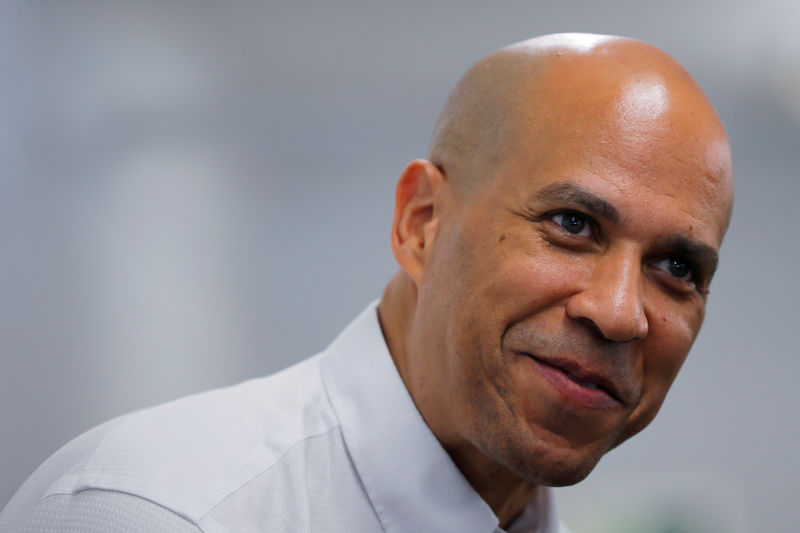By Joseph Ax
NEW YORK (Reuters) - U.S. presidential hopeful Cory Booker unveiled a $3 trillion plan to address climate change on Tuesday, vowing to reach a 100% clean energy economy by 2045 by sharply curbing fossil fuels while investing heavily in renewable energy sources.
The plan also calls for a new White House-coordinated "Environmental Justice Fund" that would focus on defending at-risk communities from environmental threats, including a nationwide lead remediation program to replace all lead water pipes for schools and residences.
Booker's home of Newark, New Jersey, where he served as mayor for seven years, has been grappling with lead contamination in its water supply in recent weeks.
"We are facing a dual crisis of climate change and economic inequality," Booker said. "Without immediate action, we risk an incredible human toll from disasters, health impacts, rising national security threats, and trillions of dollars in economic losses."
Booker, 50, has lagged behind the front-runners, including former Vice President Joe Biden and fellow U.S. senators Elizabeth Warren and Bernie Sanders. He is among the 10 candidates – out of a field of 20 – who qualified for the third Democratic debate this month in Houston.
The 10 candidates are also set to appear on Wednesday on CNN at back-to-back town halls focused on climate change.
Along with several other candidates, Booker has previously supported the Green New Deal, a Democratic-backed congressional resolution that calls for net-zero emissions by 2030 but is more of a statement of ideals than a specific legislative plan.
President Donald Trump, a Republican and climate change skeptic, has announced plans to withdraw the United States from the landmark Paris climate agreement that aims to limit global warming and has rolled back environmental regulations he says are bad for the economy.
Booker said he would impose a carbon tax on natural gas, coal and oil producers and return some of the revenue to Americans via a monthly dividend, though his campaign did not offer specific figures. Several lawmakers from both parties have introduced versions of a fee-and-dividend system in Congress, though none of the bills appear likely to pass.
The proposal includes several executive actions that Booker would take as president, including barring new offshore and onshore fossil fuel leases, requiring all new passenger vehicles be zero emission starting in 2030 and requiring fossil fuel companies to stop all methane leaks.
Booker also offered legislative reforms that would face a tough road in Congress, such as ending all fossil fuel subsidies; investing billions of dollars in energy storage, clean energy and electric vehicles; phasing out fracking; and banning fossil fuel exports by 2030.

In addition to lead remediation, the Environmental Justice Fund would clean up every abandoned coal, uranium and hard rock mine in the country, plant 100 million trees in urban areas and ensure all households have adequate plumbing, all moves Booker said would help low-income and minority communities that are hardest hit by environmental problems.